MiStory: Back home and back to work (by Danton Cole)
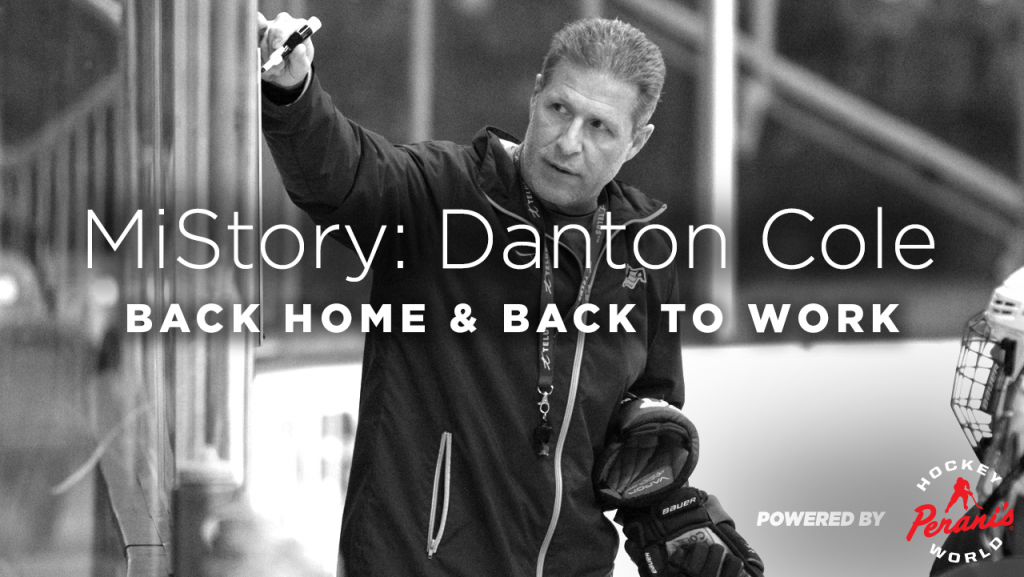
In MiHockey’s MiStory feature, we let hockey people tell their own stories with their own words. On April 11, Danton Cole was introduced as the new head coach of the Michigan State University hockey program. In the latest MiStory, Cole writes about the path to his dream job, the moment he was hired, his plans to bring his alma mater back to national prominence and more.
To read past editions of MiStory, click here.
By Danton Cole –
Growing up, I lived at Munn Ice Arena.
When the Spartans were playing at home, it was three-day weekends at the rink. Friday and Saturday night, we were there, cheering for the Green and White. Then on Sunday, it was our turn – GLAHA travel games were played on Sunday afternoons right on the same sheet of ice.
That’s when it all started for me; I remember watching guys like Leo Lynett and Russ Welch and, I really liked the number 16, so Gary Harpell, too. Michigan State hockey was on the rise, and I was along for the ride. I skated right here, right on the ice at Munn, envisioning the day that I would suit up for the Spartans.
It has always been my home rink. Before I played for MSU, while I played for MSU, after I played for MSU.
Until I showed up to coach against them in 2007. I was working for Bowling Green as an assistant coach at the time, and we showed up in East Lansing for the Spartans’ Senior Night. That’s the year MSU won a national title, by the way, so I like to think I had a small part to play in that. They had beaten us during our Senior Night, and then we came back here to Munn and we beat them.
It was an interesting time, just coming into the tunnel at Munn. I had never really turned left in there. You always just headed right, towards the MSU locker room. It was an odd feeling, being on the other side. More odd feelings as you walked onto the visiting bench. You’re always focused on the game and all that, but it was just strange, just different.
It sure is nice to turn right again.
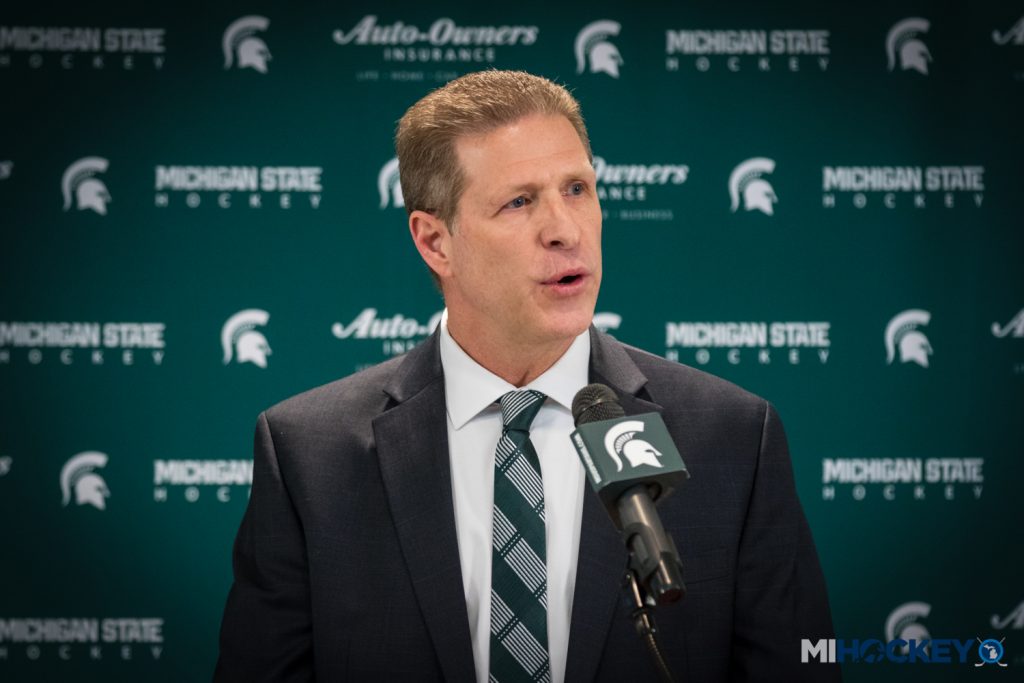
On April 9, Mark Hollis offered me the job to be the new head coach of the Michigan State University hockey program. It was a Sunday night, and Mark called; we had talked several times over the previous two weeks. As the process went along, I felt pretty good about my chances, but I’ve been through it enough to know that until the guy that’s doing the hiring says, ‘hey, we’re offering you the job’ and you accept it, nothing is final.
I got the call, and I walked into the other room. Mark and I talked for a while, and then I returned to my wife, Debbie, and told her we had been offered the job. It was a pretty exciting moment for the both of us, something we had been hoping for all along. After Rick Comley had retired in 2011, I thought the chance wouldn’t come around again, and we had started to move on. When this opportunity presented itself, it was pretty neat, and it worked out. It was an exciting time for us.
I say us, of course, because this isn’t possible without her. Players’ wives are really good, but I think coaches’ wives are great. It’s not an easy life. Deb’s been outstanding. The way things have worked out, whenever I had to move, it was usually that I would take off and she’s just left behind to put everything together. At least this time, I was able to shoot back to Saline and help out. But she’s the one that keeps everything together and keeps our three girls running on schedule and the great young women who they’ve turned out to be, I like to think I had a small part in it, but it’s mostly because of how good of a wife and a mom she is.
The girls, they’re all excited – they knew this was something we wanted to accomplish. When they were little, I think you look through a lens when you’re younger of, ‘OK, this means we’re moving, how does this affect me?’ Now, they’re older, and they knew this is what we wanted. We’re a hockey family, and they understand the life of a coach.
And that’s not to mention my parents.
I didn’t want to say a whole lot during the process, but my dad knew I was in the running. He’s a Michigan State guy, and when things were going on, I didn’t want to give him updates at every twist and turn about how things were going because I didn’t want him to get too high or too low. He and my mom, they had their fingers crossed. After I told my wife I had gotten the job, I called my dad – he was the only other person I told. It was a pretty good phone call, to say the least. I’m pretty sure he’s proud of what I’ve accomplished, and as a Michigan State guy, I know he was hoping I would have a chance at this job some day. He’s probably more happy than I am about all this.
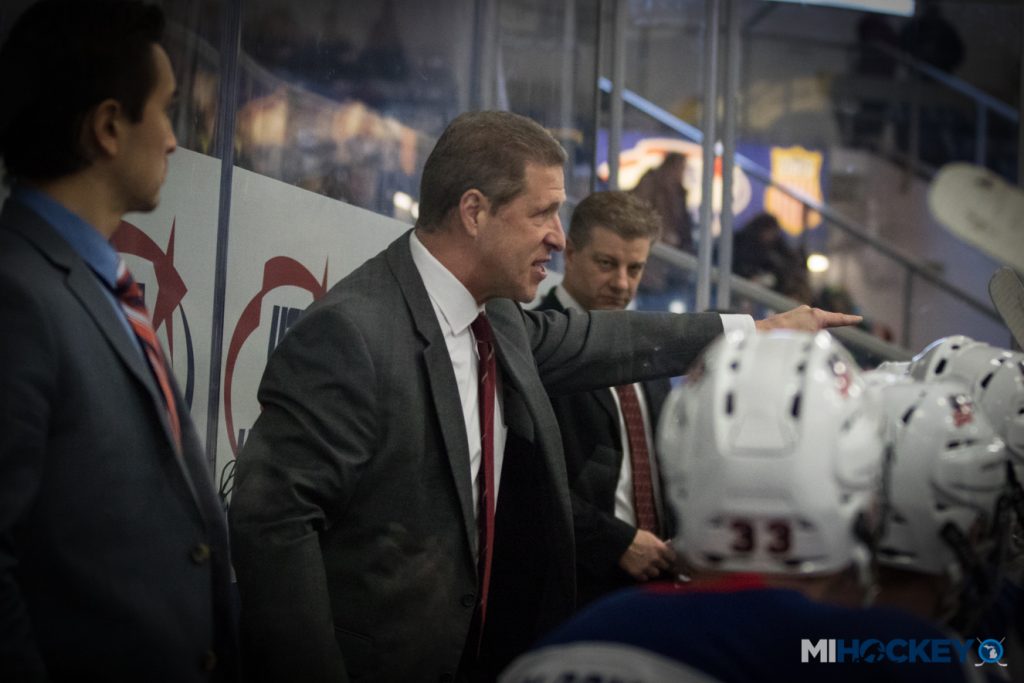
Being introduced as the seventh head coach at Michigan State on April 11 was almost more of a relief than anything else. I think I was nervous and excited leading up to it a little bit, but I was kind of chomping at the bit to get started. I hadn’t said anything to anybody in the two or three weeks going through it. I had talked to Mark Hollis and that was about it. I had kept my kids in the dark. I talked to my dad a little bit, but other than that, there was a lot of pent-up things that I had been thinking about and wanted to say and definitely the tone you want to set – that’s it’s time to get to work and get things back to the way they should be here. I was happy that we could start talking about moving forward and not watch what I’m saying to everybody all day long.
It’s funny though, because I had never really considered being a coach. When I was playing, I didn’t want to be a coach. Then, in my last year as a player out in Grand Rapids, I got hurt. The Griffins asked if I could help coach – I couldn’t play and they were still paying me, so I thought I should at least try. I worked with my head coach Guy Charron and assistant coach Curtis Hunt, and it was outstanding. They taught me the other side of the game, and I think they made me appreciate the coaching position more.
I ended up diving headfirst into it, and the first few years were such a blur that I wasn’t really looking long-term. Ron Mason was still coaching at MSU, and I talked to him a lot when I first started coaching. It would always cross your mind – ‘hey that’d be a great job to have someday’ – but at the same time, you knew Mase wasn’t going anywhere. He held that role for almost 30 years. At one point, I thought I’d probably never even get a chance at it.
Crazy, now, to think that I’m set up in his office. This is Mase’s office, not mine. I’ve been slowly moving in, haven’t put many pictures up or anything. I have a few – one’s a drawing from my daughter, Ashton, that I have always had in my office no matter where I’m coaching.
We’ll add some stuff as we go, but at the end of the day, this will always be Mase’s office, and all the rest of us who have been through here, we’re just using it.
It all goes back to the tradition and the history we have here at Michigan State. Sitting in the office occupied by Ron Mason for so long, the banners hanging over the rink, the photos that line our hallways – it’s an honor to be here, and to try to accomplish some of the things that Mase did while he was here. I am confident in what we’re going to do here, what we’re going to accomplish, and I’m confident that he would be proud of what we’re going to do and how we’re going to do it.
It’s our turn now, and we’re going to make Spartan Nation proud.
I think that as a head coach, you’re your own guy. You take a lot from the guys you played with and the guys you worked with and you even take a lot from other coaches – guys you talk to or coach against or watch. I’ve certainly had plenty of different and unique experiences as I’ve progressed through my coaching career. As I sit here in East Lansing, surrounded by a terrific staff and support system, I can’t help but think about my time as the head coach of the Muskegon Fury of the UHL – my first head coach job. That sure was interesting; you did everything. I coached, I signed all the players to contracts, I did some accounting. I did a lot and I learned an awful lot. Every skill, whether it’s been in pro hockey or college hockey or with the NTDP, you were working with players or you were fundraising or you were teaching or you were doing management things – that was an all-encompassing job in Muskegon. Tony Lisman took a chance and hired me there, and that gave me a base line in getting started as a coach. It’s just like when we talk to players and say they have to have a good base of habits and concepts before they move on – that job did that for me.
Every stop in hockey has been a memorable experience for me, and my last one – my time with USA Hockey’s National Team Development Program – was no exception. I worked with Ron Rolston, and then Donny Granato, and John Wroblewski last year, and that’s a coaching challenge we all cherished. It seems like it’s three years of coaching for every year that you’re there. You’re constantly teaching, you’re constantly motivating. You learn everything, and you have to have your hand in a bit of everything. Those young men are really, really talented, but what they have to learn and what they to go through, it’s great for them, but it’s outstanding for coaches. Every Monday, you show up, and those kids take a lot of lumps. You have to get them in the right frame of mind so they’re ready to learn and you’re ready to teach and then you have to go out and accomplish something both mentally and physically. It’s fascinating.
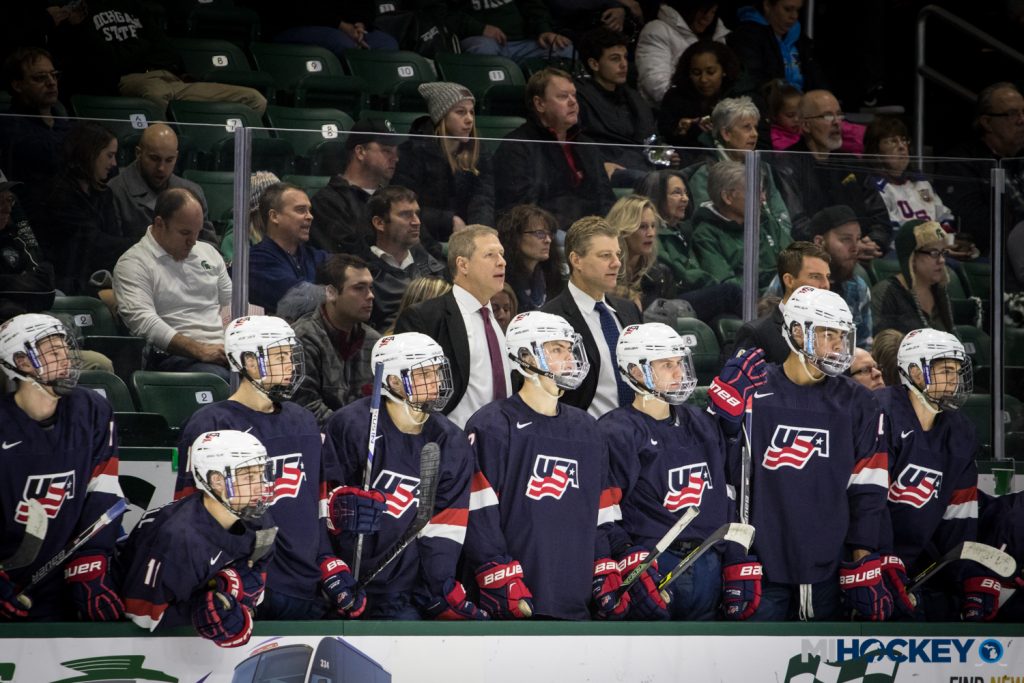
I was in my fourth cycle going through the program when I was offered the job here. You get a little more patient and you know you’re going to go through it, but it doesn’t make it any easier and you have to convince them. Just from moving forward as a coach and learning a lot, learning how to teach, I think it’s a great place. Similar to here in East Lansing. The people you get to work with at USA Hockey, they’re just outstanding.
It reminds you of why you’re in the coaching world in the first place. I try to tell young coaches and guys that are asking me for advice – don’t coach for the money, go work for really good people and work with really good people and everything else takes care of itself. I think sometimes people just say, “oh well this job pays me 500 dollars more a year, and I’m going to go do that,” and you leave a great learning and teaching situation. I’ve been really fortunate the last few stops to be with some great people.
And now, I’m here, ready for my first season as the head coach of Michigan State. The age change of the players is always interesting. I’ve went from pro guys who were my age, sometimes older than me even, to high school guys with NTDP. Now, with 18 to 24-year-olds, it’s been good. When they’re older, you can’t be as much of a control freak as you can with the high school guys. They needed it; here, in the summer, you can’t go on the ice with them, you can’t go into the weight room, you can’t do video or chalk talk, so you just have to make the ice available and make the workouts available and give them a little guidance. You have to let them be men and handle it. It’s been enjoyable – we’re not calling on curfews; you set some parameters and they’re responsible and if they’re not, then there are consequences. It’s black and white, and I like that.
It certainly makes you think about your own playing experiences, too. Chris Luongo and I played here together, we know what the boys are going through. Talking to them and hearing what they’re going through brings you back. You see team pictures and you go through and think of stories and laugh about it.
These young men are going through things that we went through and you see them do it and you kind of laugh and as long as it’s nothing serious, you just say, “oh I guess they’ll make that mistake, and hopefully learn from it,” and if it’s something bigger, you try to warn them. You see them going through a lot of the same stuff you did.
We’re all on the same page here. When we had our first staff meeting, we talked about how if what you’re doing isn’t helping us in some way, somehow, to get the program moving in the right direction, doing the right things for these young men and helping us work towards our fourth national championship, then change what you’re doing. That’s the motivating factor. That’s where we want to get back to. It’s hard to win a national championship in hockey. You’ve got to get in, and then you’ve got to do it really well for several weeks. It’s not easy, but we want to get back into that conversation and start having some kicks at the can. That’s what the staff’s been driving since I got here, and I don’t think that will change until we get one.
And then we’ll start working on the next one.
Go Green.

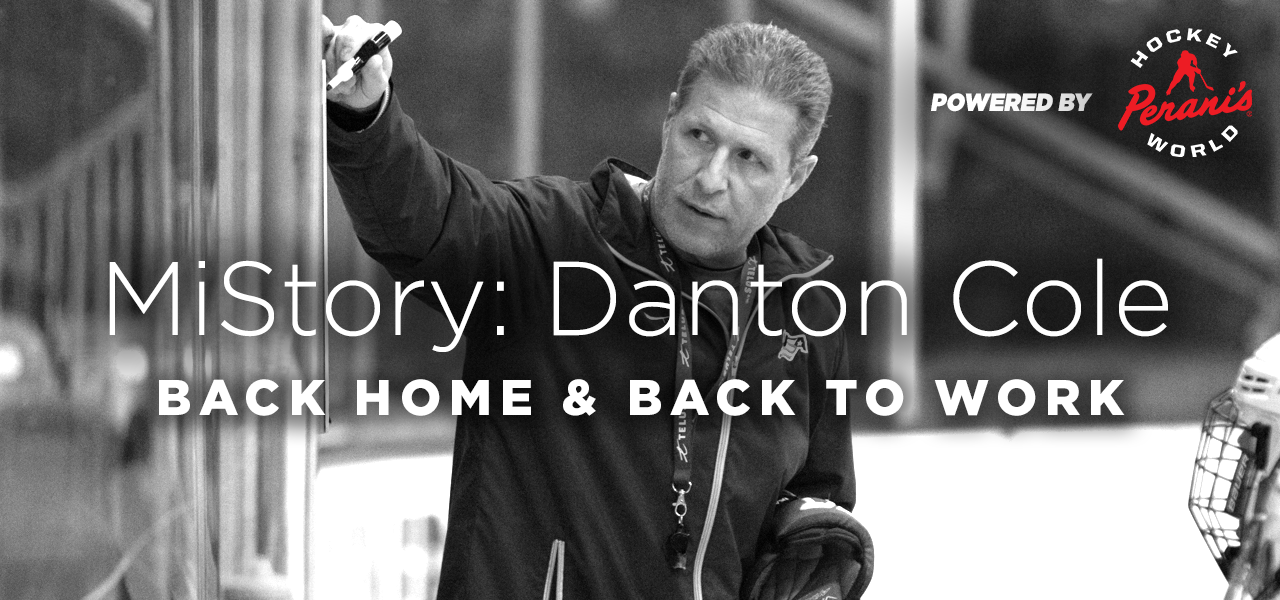
Pingback:MiStory: Back home and back to work (by Danton Cole) – Spartan Sports Page